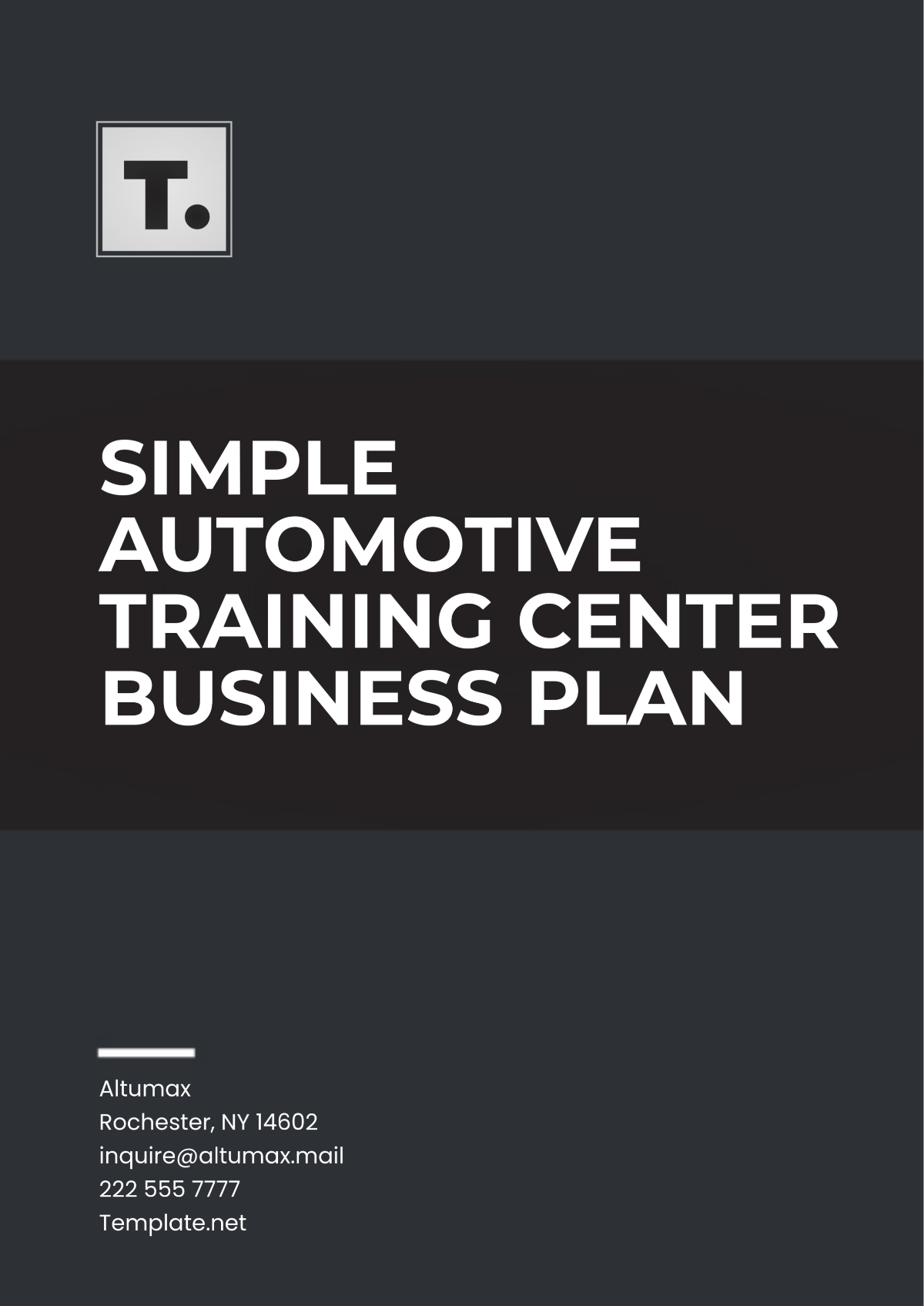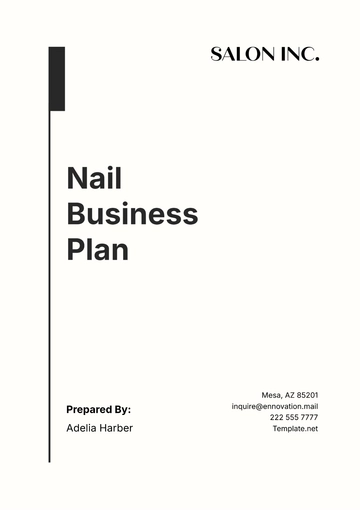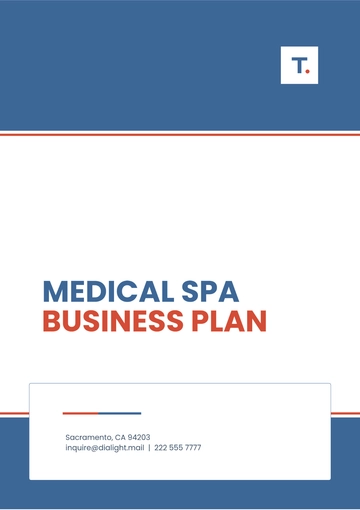Free Simple Automotive Training Center Business Plan

Prepared by: [Your Name]
Company: [Your Company Name]
Date: [Insert Date]
I. Executive Summary
Business Name: [Your Company Name] Automotive Training Center
Business Structure: LLC
Location: [Your Company Address]
Mission Statement: To provide high-quality, hands-on automotive training that prepares students for careers in automotive repair, maintenance, and technology, meeting industry standards and enhancing workforce development.
Key Services: Automotive repair and diagnostics training, engine repair, electrical systems, hybrid/electric vehicle training, and custom workshops.
Target Market: Aspiring automotive technicians, students, career changers, and professionals seeking skill upgrades.
Business Objective: To become a recognized leader in automotive education, delivering accredited training programs to prepare students for successful careers in the automotive industry.
II. Business Description
[Your Company Name] Automotive Training Center will offer practical, industry-relevant automotive training designed to equip students with the skills needed for employment in the automotive repair and maintenance field. The center will provide both basic and advanced courses, with an emphasis on hands-on training, cutting-edge technologies, and personalized instruction.
Core Services:
Automotive Fundamentals: Basic courses covering vehicle operation, common repairs, and safety protocols.
Engine Repair and Diagnostics: Training students to diagnose and repair internal combustion engines, fuel systems, and related components.
Electrical Systems: Understanding of automotive electrical systems, including wiring, sensors, and diagnostic tools.
Hybrid/Electric Vehicle Training: Specialized courses for the repair and maintenance of electric and hybrid vehicles.
Advanced Workshops: High-level workshops focusing on advanced diagnostics, engine rebuilding, transmission repair, and performance tuning.
The training center will be equipped with state-of-the-art tools and equipment used in the automotive industry to provide a realistic learning environment.
III. Market Analysis
A. Industry Overview
The global automotive industry is evolving rapidly, with growing demand for skilled technicians in areas like electric vehicles (EVs), diagnostics, and advanced technologies. As vehicle complexity increases, the need for qualified technicians who are trained to handle new technologies and repair methods has never been greater. The U.S. Bureau of Labor Statistics (BLS) projects steady growth for automotive service technicians and mechanics, with a 6% increase in employment from 2021 to 2031.
B. Target Market
Aspiring Automotive Technicians: High school graduates and career changers seeking to enter the automotive industry.
Existing Automotive Professionals: Technicians looking to upgrade their skills or specialize in emerging fields like electric vehicle repair.
Automotive Enthusiasts: Individuals passionate about cars and seeking to expand their knowledge.
Corporate Clients: Companies requiring training for their staff in the latest automotive technologies.
C. Market Trends
Electric Vehicles (EVs): Increased interest in electric vehicle repairs, maintenance, and diagnostics.
Automation and Technology: The use of automated diagnostic tools and advanced vehicle technology is rising, requiring specialized training.
Demand for Skilled Labor: A shortage of qualified automotive technicians is pushing the demand for training programs.
IV. Competitive Analysis
A. Key Competitors
Universal Technical Institute (UTI): A nationwide provider of automotive and diesel mechanic training.
Lincoln Tech: Offers automotive training programs at various locations across the U.S.
Local Community Colleges: Many community colleges provide automotive programs, often with lower tuition fees.
B. Competitive Advantage
[Your Company Name] Automotive Training Center will differentiate itself by offering:
Hands-On Training: Emphasizing practical experience with real-world automotive systems.
Experienced Instructors: Employing instructors with real industry experience to provide relevant and practical education.
Specialized Courses: Offering specialized courses in hybrid and electric vehicles, areas that many competitors may not focus on.
Flexible Scheduling: Offering evening and weekend classes to accommodate working individuals or students with busy schedules.
V. Business Structure
Ownership: [Your Company Name] Automotive Training Center will be an LLC, owned by [Your Name] and key investors.
Management Team:
CEO/Owner: Responsible for overall business strategy, growth, and financial management.
Training Director: Manages curriculum development, instructor hiring, and training delivery.
Lead Instructors: Experts in various automotive fields who will be responsible for teaching courses.
Marketing Manager: Oversees student recruitment, advertising, and branding efforts.
VI. Marketing Strategy
A. Key Marketing Channels
Website and SEO: Developing an informative website optimized for local search queries to attract prospective students.
Social Media Marketing: Using platforms like Facebook, Instagram, and LinkedIn to engage with potential students and highlight success stories.
Local Partnerships: Partnering with high schools, vocational schools, and local employers to attract students and provide apprenticeship opportunities.
Advertising: Running local ads in newspapers, automotive magazines, and community boards to raise awareness.
B. Pricing Strategy
Course Fees: Competitive pricing for each course, with discounts for multi-course packages and early registration.
Financial Aid Options: Offering flexible payment plans and financial aid options for qualified students.
Corporate Training: Special pricing for companies seeking to train multiple employees.
VII. Operational Plan
A. Facility
The training center will be located in [Location] in a [X] square-foot facility, with dedicated classrooms and an automotive workshop equipped with state-of-the-art diagnostic tools and repair equipment. The facility will be designed to accommodate [X] students at a time, allowing for small class sizes and individualized attention.
B. Equipment and Technology
Diagnostic Tools: Latest computer-based diagnostic tools for vehicle systems.
Vehicle Lifts and Tools: Professional-grade vehicle lifts, wrenches, and power tools.
Electric Vehicle Training Kits: Specialized tools and equipment for EV maintenance and repair.
Classroom Technology: Smartboards, projectors, and online resources to support interactive learning.
C. Staffing and Training
Instructors will have industry certifications and years of hands-on experience. Staff will receive regular training on new technologies and educational methods to ensure they provide up-to-date, high-quality instruction.
VIII. Financial Plan
A. Startup Costs
Facility Lease and Renovations: $100,000
Training Equipment and Tools: $150,000
Marketing and Advertising: $20,000
Initial Working Capital: $30,000
Miscellaneous: $10,000
Total Startup Costs: $310,000
B. Revenue Streams
Tuition Fees: Main source of revenue, collected per course or semester.
Corporate Training Programs: Offering customized training packages for automotive companies.
Workshops and Seminars: Hosting specialized workshops for professionals in the industry.
C. Financial Projections
Year 1: $250,000 in revenue, based on an average of [X] students per semester.
Year 2: $400,000 in revenue, with increased enrollment and expanded course offerings.
Year 3: $600,000 in revenue, as the center becomes established and gains local recognition.
D. Break-Even Point
The training center is projected to break even within the first 18 months of operation.
E. Funding Requirements
We are seeking $310,000 in funding to cover startup costs, with the plan to obtain funding through a combination of owner equity, loans, and grants.
IX. Risk Analysis
A. Market Risks
Economic Downturn: Reduced student enrollment during periods of economic uncertainty.
Competition: Increased competition from larger, national training institutions.
B. Mitigation Strategies
Diversification: Offering a variety of courses and specialized programs to appeal to a broader range of students.
Partnerships: Building relationships with local employers for job placement opportunities, which increases the value of the training program.
X. Conclusion
[Your Company Name] The Automotive Training Center is poised to meet the growing demand for skilled automotive technicians by offering high-quality, hands-on training in the latest automotive technologies. With a strong market demand, a dedicated team, and comprehensive training offerings, we are confident in our ability to help students succeed and fill the industry’s workforce needs.
- 100% Customizable, free editor
- Access 1 Million+ Templates, photo’s & graphics
- Download or share as a template
- Click and replace photos, graphics, text, backgrounds
- Resize, crop, AI write & more
- Access advanced editor
You may also like
- One Page Business Plan
- Coffee Shop Business Plan
- Restaurant Business Plan
- Food Business Plan
- Real Estate Business Plan
- Executive Summary Business Plan
- Cover Page Business Plan
- Nonprofit Business Plan
- Daycare Business Plan
- Construction Business Plan
- Startup Business Plan
- Medical Business Plan
- Bakery Business Plan
- Service Plan
- Hotel Business Plan
- Catering Business Plan
- School Business Plan
- Healthcare Business Plan
- Transportation Plan
- Sports Plan
- Car Wash Business Plan
- Salon Business Plan
- Clothing Business Plan
- Farming Business Plan
- Boutique Plan





























